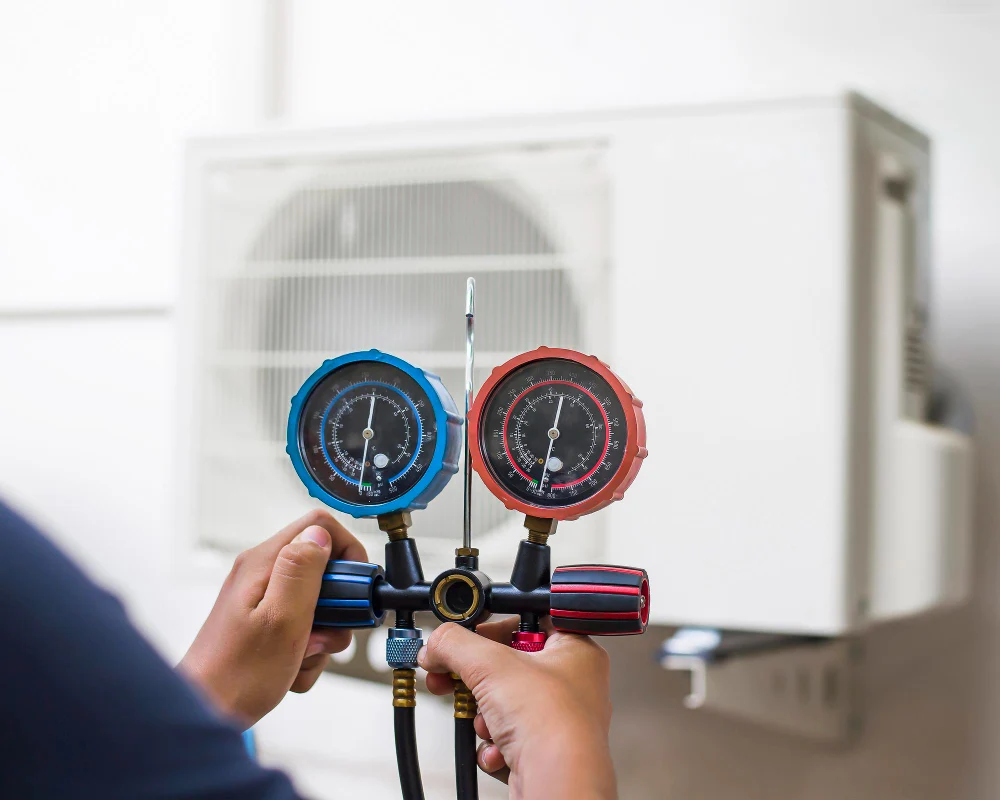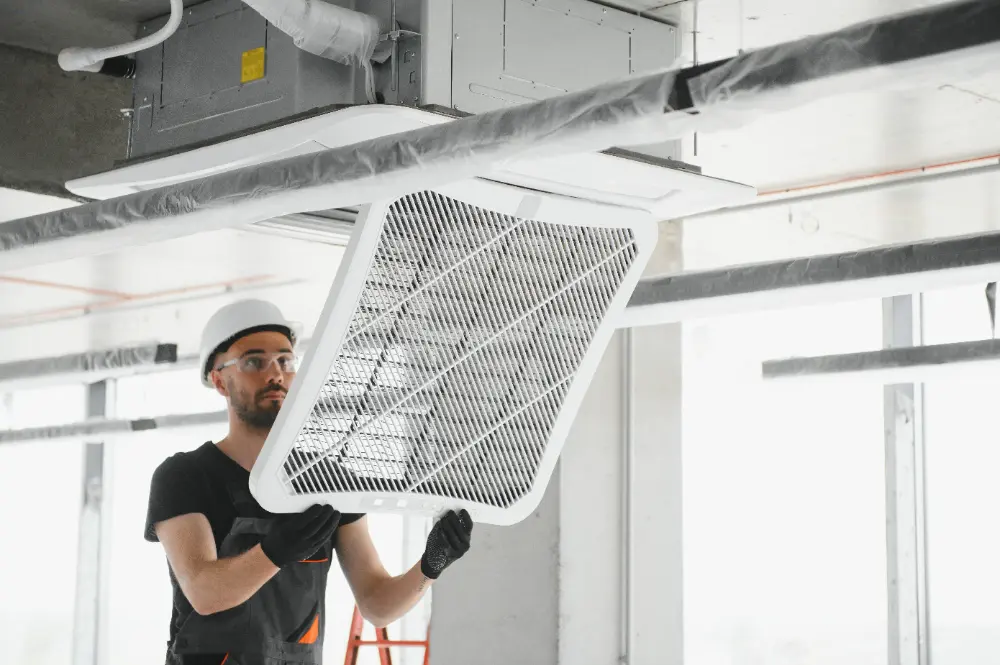
06 Jan What Do HVAC Designers Do? Exploring Their Role in Air Conditioner Maintenance Service
HVAC designers play a significant role in designing, implementing, repairing, and maintaining Heating Ventilation and Air Conditioning systems. HVAC systems effectively regulate indoor environments in residential, commercial, industrial, and institutional buildings. It aims to provide comfortable, healthy, and energy-efficient indoor environments for building occupants. HVAC technicians are skilled in inspecting and maintaining the overall functionality and efficiency of the system. Air conditioner maintenance service is a major responsibility of HVAC technicians. It is essential to ensure proper indoor air quality and regulate temperature and humidity levels, particularly in regions like Qatar. The climatic and environmental conditions of the region demand sophisticated HVAC systems.
Heating Ventilation and Air Conditioning (HVAC) Design
During cold weather, the heating component makes the air warmer. The ventilation component circulates fresh air. During hot weather, the air conditioning component makes the air cooler and dehumidifies it. HVAC design includes a comprehensive process aimed at creating systems that regulate indoor environments. The design process involves the following activities:
- Load Calculation: Load calculation is the process of determining the heating and cooling loads of a space for sizing HVAC equipment appropriately. Building size, occupancy, orientation, insulation, and climate conditions are the factors to be considered while calculating the load.
- System Selection: After load calculations, the designers select the appropriate HVAC system type, which can be a forced-air system, radiant heating, or a combination of various technologies. Factors like energy efficiency, space constraints, and budget influence system selection.
- Ductwork and Piping Design: It is necessary to initially determine the layout of ducts and pipes for designing the distribution network for air and water. Ideal ductwork and piping design ensure proper airflow and fluid circulation throughout the building.
- Equipment Sizing: After choosing the appropriate system type, equipment such as furnaces, air conditioners, boilers, and heat pumps are sized to match the calculated load. Equipment sizing is done carefully for optimal performance and energy efficiency.
- Control Systems: HVAC designers integrate control systems to regulate temperature, humidity, and airflow, often incorporating smart technology for improved efficiency and comfort.
- Ventilation and Air Quality: HVAC design includes provisions for adequate ventilation to maintain indoor air quality, which involves the selection and placement of air filters, exhaust systems, and fresh air intake mechanisms. Air conditioner maintenance service is crucial in maintaining the air quality.
HVAC Training
A comprehensive HVAC training covers a wide range of topics related to HVAC systems, including design, installation, HVAC unit maintenance, troubleshooting, and repair. Heating Ventilation and Air Conditioning training offered by leading institutes like BMTC Consulting provides a solid foundation in various aspects of HVAC systems. You will get the opportunity to work with HVAC equipment, tools, and instruments under the guidance of experienced instructors. This practical experience is essential for mastering HVAC techniques and you will be confident in performing tasks such as installing, maintaining, and repairing HVAC systems. You will be trained to conduct regular inspections and HVAC system care like air conditioner maintenance service, refrigerant check, cleaning, overall HVAC unit maintenance, and a lot more.
- Technical Skills: Heating Ventilation and Air Conditioning training courses focus on developing technical competencies in HVAC system design, installation, troubleshooting, HVAC unit maintenance, and repair. The training focuses on industry best practices and safety protocols.
- Regulatory Compliance: Through HVAC training you will get familiar with local building codes, regulations, and standards related to HVAC system design, installation, and operation to ensure compliance and quality assurance.
- Energy Efficiency: As there is a growing emphasis on sustainability and energy conservation, HVAC training includes modules on energy-efficient HVAC technologies, renewable energy integration, and green building practices.
- Advanced Technologies: In HVAC training candidates will be introduced to cutting-edge HVAC technologies such as variable refrigerant flow (VRF) systems, energy recovery ventilation (ERV), and Building Management Systems (BMS).
- Hands-on Training: During the training, you will have the opportunity to collaborate with industry experts, HVAC manufacturers, and regulatory bodies. Candidates will get real-world insights, hands-on experience, and networking opportunities. Enrolling in the HVAC training will help you stay updated on industry trends and practices.
Heating Ventilation and Air Conditioning training provide opportunities for professional certification, continuing education, and career advancement. Aspiring candidates trained in HVAC will be able to pursue entry-level positions such as HVAC technicians, installers, HVAC unit maintenance technicians, or service technicians in various sectors, including residential, commercial, industrial, and institutional settings.

HVAC System Care
HVAC system care is an important responsibility of HVAC technicians. Regular inspections, cleaning, adjustments, maintenance, and repairs should be done to ensure optimal performance, energy efficiency, and longevity of HVAC systems. Proper maintenance services like air conditioner maintenance services help prevent breakdowns, reduce energy consumption, and extend the system lifespan. HVAC technicians conduct comprehensive inspections of various equipment to identify any issues or potential problems. Technicians ensure unrestricted airflow and heat exchange by conducting periodic cleaning of the components. Electrical connections, controls, and wiring are inspected for signs of damage, corrosion, or loose connections that could compromise system safety or performance. Regular HVAC unit maintenance will help to reduce energy costs and avoid costly repairs or premature replacement.
To Wrap Up
HVAC systems play a vital role in maintaining comfortable, healthy, and energy-efficient indoor environments. HVAC training in Qatar like the one offered by BMTC consulting helps professionals contribute to the sustainable development goals and enhance the quality of life of the residents. BMTC’s Heating, ventilation, and air conditioning (HVAC) course curriculum includes theoretical coursework and practical training, which helps candidates gain a deep understanding of HVAC principles and practices. Apart from HVAC training, BMTC offers several other courses like Project Management Professional Course, Leed certification training, and more.
FAQ’s
- What is the importance of air conditioner maintenance service in HVAC systems?
Air conditioner maintenance service is a critical aspect of HVAC system care that involves regular inspection, cleaning, adjustment, maintenance, and repair of air conditioning equipment.
- What does air conditioner maintenance service involve?
Air conditioner maintenance service in HVAC typically includes tasks such as inspecting and cleaning components like condenser coils, evaporator coils, filters, and drainage systems. Technicians also check refrigerant levels, inspect electrical connections, lubricate moving parts, calibrate thermostats, and perform tests to ensure proper system operation and efficiency.
- Who can benefit from Heating Ventilation and Air Conditioning training?
HVAC training is suitable for anyone interested in knowing more about HVAC systems or pursuing a career in the HVAC industry. HVAC training is ideal for graduates, experienced technicians, or professionals who wish to upgrade their skills or earn industry certifications.
- What topics are covered in HVAC training programs?
HVAC training programs cover a diverse range of topics relevant to the HVAC industry, including thermodynamics, fluid mechanics, psychrometrics, electrical circuits, refrigeration cycles, ductwork design, HVAC controls, energy efficiency, indoor air quality, environmental regulations, and safety protocols.
- What are the benefits of HVAC training?
HVAC training provides opportunities for career advancement, higher earning potential, and professional development through industry certifications and continuing education. Professionals trained in HVAC help design systems for comfortable, healthy, and energy-efficient indoor environments for homes, businesses, and communities.

